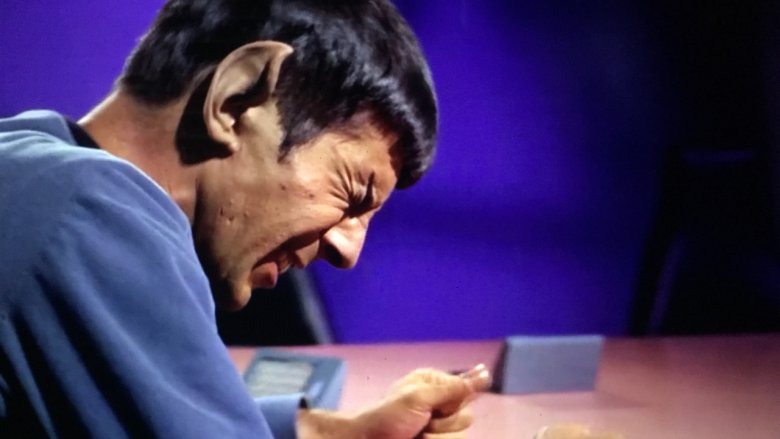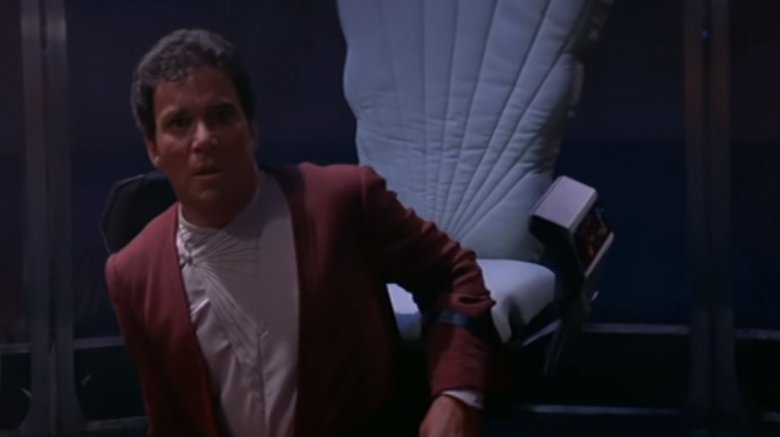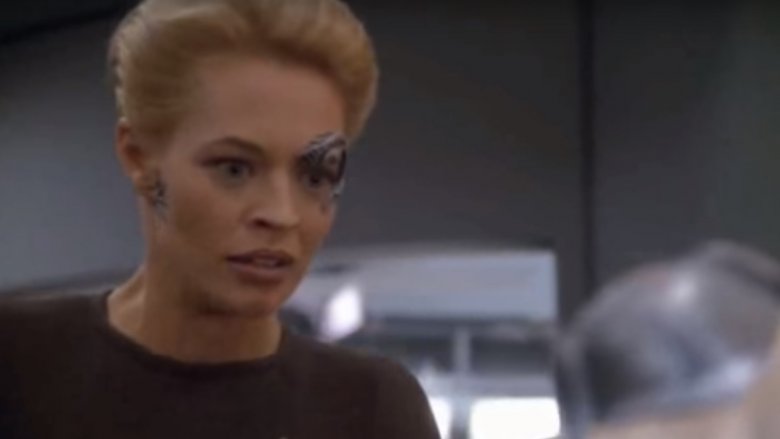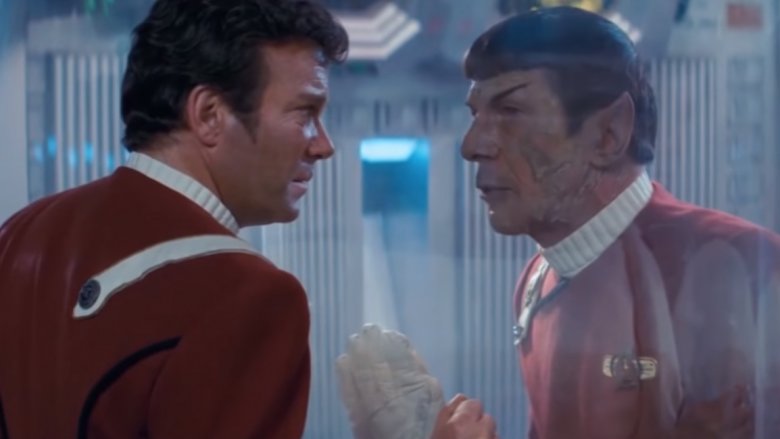Star Trek Moments That Secretly Made Us Cry
Star Trek is generally a show designed to make you think. Characters tackle philosophic questions as they explore strange new worlds, and the intellectual debates of the crew are meant to continue with audiences long after the episode ends. Every now and then, though, Star Trek doesn't just makes its audiences think—it makes them cry.
The destruction of the Enterprise
For both viewers and its crew, losing that ship was felt just as keenly as the loss of a family member, and the prolonged scene in Star Trek III: The Search for Spock milks the drama of the event (along with quite a few audience tears).
In the movie, Kirk and the crew have stolen their own ship from Starfleet and taken it to the Genesis planet. The destination is forbidden, but Kirk is determined to bring Dr. McCoy to the planet, as McCoy is now carrying around the deceased Spock's katra (not to be confused with Spock's Brain) and is determined to retrieve Spock's body from the planet. Eventually, Klingons board the ship and are about to take it over, and Kirk orders the Enterprise's self-destruct sequence. They beam down to the Genesis planet and watch the remains of the exploded ship slowly burn up in the atmosphere.
If the sight of the disintegrating doesn't make you cry, Kirk and McCoy's conversation might. "My God, Bones," asks a stunned Kirk, "what have I done?" McCoy replies, "What you had to do. What you always do. Turn death into a fighting chance to live." It's a perfect encapsulation of the movie's theme and of Kirk's character, wrapped up with great visuals and a stirring soundtrack.
Neelix leaves Voyager
Star Trek: Voyager really took the "ragtag crew" notion about as far as it could go, mixing a crew of thieves and rebels with prim and proper Starfleet officers. Perhaps no one was quite as ragtag as the alien native of the Delta Quadrant, Neelix. He ends up joining Voyager and becoming its cook (a necessity because rationing keeps people from just making any meal at any time with the replicator), and quickly establishes himself as the heart of the crew. All of this adds up to his departure from the ship, which is secretly one of Trek's saddest moments.
Neelix tries to quietly walk to the transporter room, but what seems to be the entire crew is standing in the hallways as a kind of honor guard as he walks through. Captain Janeway calls the often-silly Neelix "Ambassador," and the ever-serious Vulcan Tuvok briefly demonstrates that he has finally learned a dance move that Neelix was trying to teach him previously. Seeing the crew like this really highlights the difference that Neelix has made in their lives, and after he leaves the ship, we see him embraced—a confirmation that Neelix, who has often been lost and lonely, has finally found his way to some place he can truly call home.
Odo's unrequited love
If you were picking which characters would hook up when Star Trek: Deep Space Nine started, Odo and Kira would probably have been your absolute last choices. He was the gruff shapeshifter that had previously worked on the space station when Cardassians ruled, and Kira was a straight-up former terrorist who had dedicated her life to driving away those Cardassians and finally helped her planet achieve freedom.
In the episode "Heart of Stone," Kira and Odo end up on a strange planet while chasing after a Maquis rebel. They split up to find him, and when Odo sees Kira again, she is in a bizarre crystalline trap that's expanding and threatening her life. At the same time, mysterious tremors are shaking the planet and threaten them both. Kira tries to order Odo to leave so that they don't both die, and when she expresses confusion as to why he doesn't leave, he pours his entire heart out, confesses his love, and falls to his knees. She tearfully confesses that she loves him too, and at this point, audiences are crying right along with her.
Soon, though, the episode twists the knife in our hearts in classic Deep Space Nine fashion: "Kira" is a shapeshifter who, as the Maquis, had lured Odo out there to bring him back to the Dominion. Odo refuses, and he retrieves the real Kira, but this Kira has not returned Odo's love. In fact, the episode ends with her completely unaware that Odo's love for her is so great that he is willing to die for her.
The death of Spock's mother
Of all of the character changes made in the rebooted Star Trek universe, Spock arguably received the greatest ones. Most characters are simply portraying enhanced versions of their original archetypes (such as Kirk, McCoy, and Uhura), but the 2009 Star Trek portrayed a young Spock that's rougher around the edges and more emotional. This was made clear in the scene where he valiantly tries to save his family and some other Vulcans from the destruction of the planet, only to lose his mother.
It starts with a clearly anxious Spock beaming down to a planet that's disappearing by the second, even as Kirk warns him that it's futile. We see Spock gather his mother, father, and other Vulcan VIPs and get them outside of the cave they were in so they can be safely beamed up. Seconds before they all safely beam away, the rocky outcropping his mother is standing on falls away, and she falls to her death. We see Spock reach out and scream "mother," but it's too late: she is gone and the rest are now beaming up.
Back onboard the ship, we see Spock is clearly in shock, and he can't stop staring at the empty spot on the transporter pad where she should be. If you're not already sad as hell, we cut from this to seeing Spock's entire planet be destroyed by Nero's superweapon. Spock hasn't just lost his mother. He's now lost almost the entirety of his race.
Death of Data's daughter
If you were trying to summarize Star Trek: The Next Generation in just a few words, you might be tempted to go with "Data learns what it means to be human." This simple description covers entire swaths of Next Gen episodes, but the most poignant one might be the episode "The Offspring," in which Data tries to construct an artificial child. A Starfleet admiral shows up to spirit the child away, and he spends a fair amount of time questioning Data's fitness as a father and whether the android officer has the right to keep his "child" onboard. The admiral is proven completely wrong in one of the saddest scenes in the series.
Data's child inexplicably develops emotions, something Data himself could never do. However, it comes at a price: her positronic brain burns out and she is going to die.
Right before the sad scene in question, we see the humbled admiral discussing Data: "His hands were moving faster than I could see, trying to stay ahead of each breakdown. He refused to give up. He was remarkable." Then we get the scene where Data says goodbye to his dying daughter. She expresses her love, and he reluctantly admits he cannot experience them with her. She vows to feel enough for both of them and thanks Data for her life before her speech degrades into random words and she dies before our very eyes, leaving Data once again alone in the universe (well, except for the occasional visit from his evil brother).
Tasha Yar's memorial service
Denise Crosby's run on Star Trek: The Next Generation was not really that notable. She was constantly overwritten or underwritten, and the writers gave up and killed her in the most ignominious way possible: she was casually killed by a malevolent alien being named Armus. That moment was too weird and abrupt to be sad, but the episode in which she dies ends with a surprisingly moving memorial scene on the holodeck that's likely to replicate a few viewer tears.
Her hologram appears as part of a pre-made program, and she declares that the crew is her family and they transformed her from an "angry young girl" to the woman she became. She has a personalized message for Picard, saying that she would claim he was like a father to her, but having never had a father, she has no idea what that feels like.
Data comments that even though the ceremony is supposed to be about Tasha, he cannot stop thinking about himself ... specifically, about how empty his life will be without Tasha in it. Oblivious to human emotion, he asks Picard if he has missed the point of the ceremony. Picard, with pinched lips, tells him that he did get the point of it and walks away, leaving us with the last, lingering notes of the saddest music Star Trek: The Next Generation ever created.
The Death of Edith Keeler
A freak accident overdoses McCoy on drugs right as the Enterprise is visiting a planet with one inhabitant: a talking portal to all of time and space called the Guardian of Forever. McCoy beams to this Guardian, and Kirk and Spock are in hot pursuit. McCoy jumps through the portal into the past, and they have a problem: the Enterprise is no longer in orbit due to something McCoy did in the past. The crew near the Guardian were protected from this change, so Kirk and Spock try to go back to when and where McCoy went to fix history.
They end up in New York in the 1930s. In classic Kirk fashion, he ends up falling in love with a woman there named Edith Keeler. Spock spends a lot of time trying to MacGyver his tricorder back together to figure out what McCoy changed. As horrible fate would have it, McCoy's act was simply saving Edith Keeler from dying in an accident. She became a pacifist leader and successfully kept America out of World War II, giving Nazi Germany enough time to create nuclear bombs and take over the world.
Soon after, Kirk and Spock are finally reunited with McCoy, and an oblivious Keeler crosses the street to meet them. When a fast truck starts heading toward her, Kirk fights the urge to save her and holds McCoy back, letting the woman Kirk loves die. McCoy is horrified, saying he could have saved her and asking Kirk if he knows what he just did. Kirk, meanwhile, can't stop staring at her dead body as Spock replies, "He knows, Doctor. He knows."
The End of Lower Decks
The fittingly named Star Trek: The Next Generation episode "Lower Decks" gave us a glimpse of the junior officers that the show typically uses simply as background characters. We get a special emphasis on a Bajoran named Sito, and characters like Picard and Worf challenge her to get her to stand up for herself. It turns out that this was their roundabout way of testing whether she was suitable for a secret mission.
She agrees with the plan but never returns home, and the crew verifies that she died. This leads to a tear-jerking speech from Picard that calls her one of their "finest officers" and a "young woman of remarkable courage and strength of character." In addition to the stirring words from Picard, the reaction shots of her various friends as they find out she is dead goes straight to the heart, as does the final shot of Picard: he seems to crumple in his seat, seeming less like a powerful starship Captain and more like a tired, aging father realizing that he cannot protect his children from the dangers of the universe.
The Last Picard
Speaking of aging fathers, one of the most emotional moments in Star Trek sneaks up on viewers because it seems so out of place. In Star Trek: Generations, the first big screen foray for the members of the Next Generation crew, Picard finds out that the brother and nephew mentioned earlier burned to death in a fire back on Earth. In addition to being a pretty nasty death for people who he deeply cared for, the incident haunts Picard because he suddenly realizes that there's no one but him to carry on the Picard name. He confesses all of this in a sad scene to Counselor Troi, admitting that the nephew who burned was as close to a son as he had ever had and that there would be "no more Picards," ending a proud family lineage that stretches back for centuries.
Ultimately, this scene is sad on many different levels, from the brutality of family members burning to death to our keen awareness of Captain Picard's mortality (and, by extension, our own).
The death of Kirk's son David
William Shatner's acting style has always been the butt of a lot of jokes, though it's probably more because the stereotypes and comedic impersonations of Shatner at some point became better-known than anything he ever did in front of the camera. But despite the fact that he hammed it up an awful lot, and despite the fact that he's always been able to have a good laugh at himself, William Shatner was not a terrible actor. One only has to watch his performance during that awful moment in Star Trek III: The Search for Spock, when the Klingons kill his son David and the Vulcan/Romulan officer Saavik coolly informs him via communicator what has just happened.
Kirk stumbles backward in shock, bumps into his own chair and falls to the floor, and then dissolves into grief, with the words, "You Klingon bastards, you killed my son!" There's nothing hammy about it, apart from the "Klingon bastards" bit, which, sure, is a little cringe-worthy, but that one is hardly on Shatner. Kirk's grief seems genuine, and you can see the struggle in his mind — does he submit to his grief, or does he stand up, compose himself, and resume being a Starfleet officer? And the sympathetic silence of McCoy and Scotty only adds to the awful wretchedness of the whole sad scene.
When Seven of Nine's adopted son sacrifices himself
Star Trek has always enjoyed toying with the emotions of people who either aren't supposed to have emotions or who really aren't very good at handling the emotions they do have. After spending 13 years as a Borg drone, Star Trek: Voyager's liberated Seven of Nine was super messed up. She had no idea how to be human and she was really bad at interacting with other people. Her social awkwardness was both embarrassing and endearing, and it was also a big part of why she was such a popular character. Her skin-tight catsuits certainly had nothing to do with it.
Anyway, Seven of Nine had a difficult time relating to and understanding the humans around her, so when she got the opportunity to take another not-part-of-the-collective Borg drone named "One" under her wing, she became a sort of mother figure to him. But the relationship was doomed, of course, and when One accidentally contacted the Borg collective (because of course he did) he decided the only way to save Seven and the crew of Voyager was to terminate himself. The Doctor tried to save him, but One refused help, despite Seven's pleas: "You must comply. Please. You are hurting me."
Seven's confusion about One's death and her own feelings is palpable, and really, really sad. Just as she's discovering her maternal instincts, she's forced to confront maternal grief, and that just sucks.
The death of Spock
Okay, so absolutely no one cried secretly when Spock died in Star Trek II: The Wrath of Khan. If you saw this movie in the theater, you bawled collectively with everyone else, like a Borg cube with a short. But you can't talk about emotional Star Trek moments and completely ignore the most memorable death in franchise history. It just wouldn't be right.
If you're one of the three people left in the universe who haven't watched this scene, Spock basically sacrifices himself in a radiation-flooded chamber in order to give the Enterprise enough power to escape from the about-to-explode Genesis device. Everything about this scene is tear-jerky. First, Scotty and McCoy have to hold back Kirk as he recklessly runs toward the radiation-filled chamber. Then an incapacitated Spock somehow manages to struggle to his feet but still has the presence of mind to arrange his uniform, lest someone think he wasn't up to Starfleet standards in his last moments.
"Don't grieve, Admiral," he says to Kirk. "It was logical." And then after a few words of friendship and the ubiquitous farewell: "Live long and prosper," Spock slumps against the glass and dies. And on the other side of the glass in an almost mirror image, Kirk slumps against the glass and stares, stunned, into nothing. The whole thing is freaking devastating, and one of Trek's most memorable moments.



